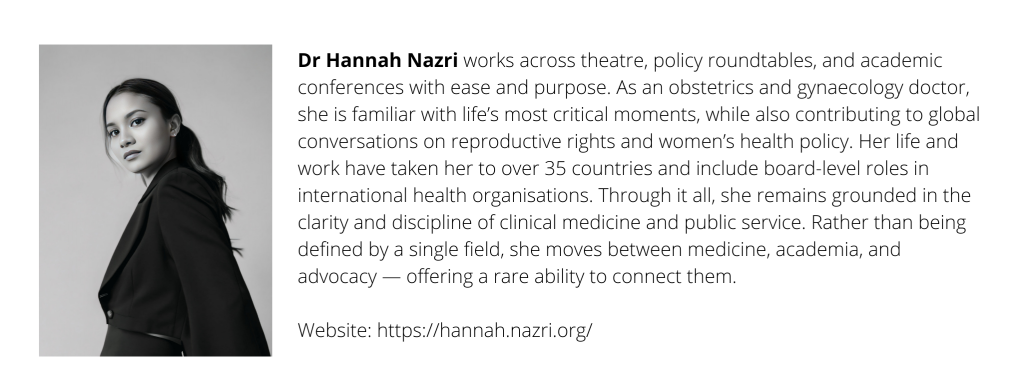Also re-published in Ova Health – The Galen Centre on 1st November 2024 here.

The tragic case of Jia Xin Teo and Baby Teo1 in the United Kingdom casts a heartbreaking light on Malaysia, bringing attention to the alarming prevalence of infanticide cases across Malaysia. Since 2018 to February 2024, there have been 509 recorded instances of attempted or completed infanticide2, often referred to as “baby dumping” (I thoroughly detest this term) in Malaysia – a term that describes the devastating act of abandoning newborns, often in unsafe places, leading to their subsequent demise. Unfortunately, infanticide is not a new phenomenon in Malaysia. While baby hatches were established by the government as a means for mothers to anonymously leave their infants, these facilities are not widely accessible and have not proven to be an effective solution.
At the same time, while conversations on financial literacy continue to echo through Malaysia, the pressing need for health literacy – especially comprehensive sexual and reproductive health education – remains neglected. A brief introduction to reproductive biology in secondary school is insufficient preparation. Many Malaysians, myself included, barely recall learning about contraception beyond its existence. Since I left school, further efforts to strengthen sexual and reproductive health education have undoubtedly been made through the National Reproductive and Social Health Education Policy, but improvements could come sooner. Comprehensive sexual health education should go beyond covering about contraception and sexually transmitted diseases (STDs), but to also medical risks of teenage pregnancy, young parenting, the concepts of bodily autonomy, dangers of sexting and pornography, the foundations of a healthy relationship, as well as a thorough understanding of where to seek help. Equally important, in my view, are topics often omitted, such as clitoral anatomy, menstrual health, fertility, and menopause.
Research shows that abstinence-only education is ineffective3 in lowering teen pregnancy, another issue closely related to infanticide in Malaysia. In fact, A 2009 UNESCO review of 87 studies4 found that none of these comprehensive sex education programme prompted earlier sexual activity; in fact, one-third of the programs reduced the frequency of sexual activity, and over a third led to a decrease in the number of sexual partners. We must also offer comprehensive sexuality education to teens, young adults, and adults who missed this vital instruction earlier. This should be emphasised and reinforced through tertiary education, at governmental health centres, and various Ministry of Health information portals.
Stigma, however, poses a significant barrier in Malaysia. A simple act like buying a pack of condoms at a local pharmacy or seeking a gynaecologist for further contraceptive options or a cervical smear test if unmarried often invites unwarranted questions or judgemental stares. Friends have shared similar experiences, where healthcare professionals place undue focus on marital status. Additionally, many healthcare professionals seem unaware of the legal standing of abortion in Malaysia, with 59.2% viewed abortion as taking one’s life5.
Abortion, in fact, has been legal in Malaysia since 19896 for up to 22 weeks’ gestation (for Muslims up to 20 weeks’ gestation with varying caveats as stipulated by the National Fatwa Council)7 for cases in which continuation of pregnancy would jeopardise a woman’s mental and/or physical health, with no limits in cases for severe fetal abnormalities and in maternal life-saving situations. Despite legal access, the option remains hard to navigate, and social stigma endures.
Clearly, the lesser of all evils, is to provide accessible contraception and abortion services – rather than the dire of option of infanticide, which has somewhat become a national phenomenon.
Teo’s Malaysian upbringing, her recent move to the United Kingdom, her desperate measures to conceal her pregnancy from everyone, then to face a complicated labour own her own and the subsequent infanticide, painfully underscores our nation’s critical shortfall in sexual and reproductive health education and the deep-rooted cultural and religious stigma surrounding women’s bodily autonomy. While I sympathise to an extent with Teo due to these constraints, I struggle to excuse her poor decisions, especially considering the availability of resources online and the reduced stigma for single, pregnant women in the United Kingdom. This may partly explain the lack of public empathy for her in the United Kingdom, as she is 22 years old, and therefore, seen as an adult fully capable of making decisions – murdering a newborn is beyond forgivable. May Baby Teo rest in peace.
As a Malaysian obstetrician and gynaecologist in the United Kingdom, this tragic case hits close. I am deeply saddened and profoundly ashamed that, despite the stark reality of these cases no meaningful progress has been made to address the issue of infanticide in Malaysia. This tragic case is, undeniably, a reflection of our collective failure.
NB: The time limit for abortion in Malaysia has been further clarified. I had previously stated 24 weeks’ gestation in error, which is the limit in the United Kingdom; however, the correct limit in Malaysia is 22 weeks.
References:
- Student convicted of killing newborn baby | The Crown Prosecution Service. Cps.gov.uk. Published October 24, 2024. Accessed October 30, 2024. https://www.cps.gov.uk/west-midlands/news/student-convicted-killing-newborn-baby
- Nancy Shukri: 509 baby dumping cases reported from 2018 to February. Malay Mail. Published March 25, 2024. https://www.malaymail.com/news/malaysia/2024/03/25/nancy-shukri-509-baby-dumping-cases-reported-from-2018-to-february/125435
- Stanger-Hall KF, Hall DW. Abstinence-Only Education and Teen Pregnancy Rates: Why We Need Comprehensive Sex Education in the U.S. PLoS One. 2011;6(10):e24658. https://doi.org/10.1371/journal.pone.0024658.
- UNESCO. Online Programme and Meeting Document International Technical Guidance on Sexuality Education: An Evidence-Informed Approach for Schools, Teachers and Health Educators.; 2009. https://unesdoc.unesco.org/ark:/48223/pf0000183281.
- Low WY, Tong WT, Gunasegaran V, eds. Issues of Safe Abortions in Malaysia: Reproductive Rights and Choice. UNFPA Malaysia; 2013.
- LAWS of MALAYSIA REPRINT Act 574 PENAL CODE.; 2006. https://ccid.rmp.gov.my/Laws/Act_574_Panel_Code_Malaysia.pdf
- GUIDELINES on TERMINATION of PREGNANCY (TOP) for HOSPITALS in the MINISTRY of HEALTH KETUA KETUA NEGARA KESIHATAN MALAYSIA DIRECTOR GENERAL of HEALTH MALAYSIA.; 2012. https://www.moh.gov.my/moh/images/gallery/Garispanduan/Guideline%20On%20TOP%20for%20Hospitals%20in%20MOH.pdf
Related posts:
- The Future is Female: #IWD2024 – Gender Pain Gap
- Empowering Healthcare Professionals: Unveiling the Harms of Female Circumcision in Malaysia
- ‘We’re not hysterical’ – A call for action on the gender pain gap in Malaysia | The Star Malaysia
- Female Circumcision is Unnecessary: Girls Are Perfect as They Are
- Malaysia: FGM/C, Period Spot Checks, and Sexual Harassment | Harvard Public Health Review
- Countering Everyday Extremism Against Women: The Other Pandemic
Like what you read? Subscribe to my blog.
About the Author: Hannah Nazri


